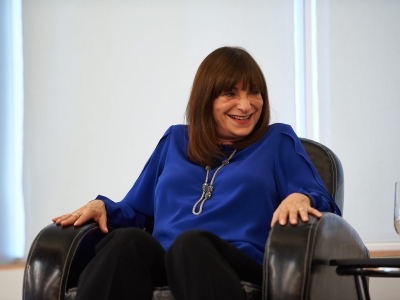By Dan Rubinstein
Photos by Yuli Scheidt and Courtesy of Pascale Arpin
Carleton University alumna Amanda Hadi calls herself an Internet detective.
Last May, after spending the last decade working for a succession of arts organizations, the Bachelor of Humanities grad changed jobs.
She got a gig as a talent sourcer at Shopify, the already booming e-commerce company that’s become indispensable during the pandemic.
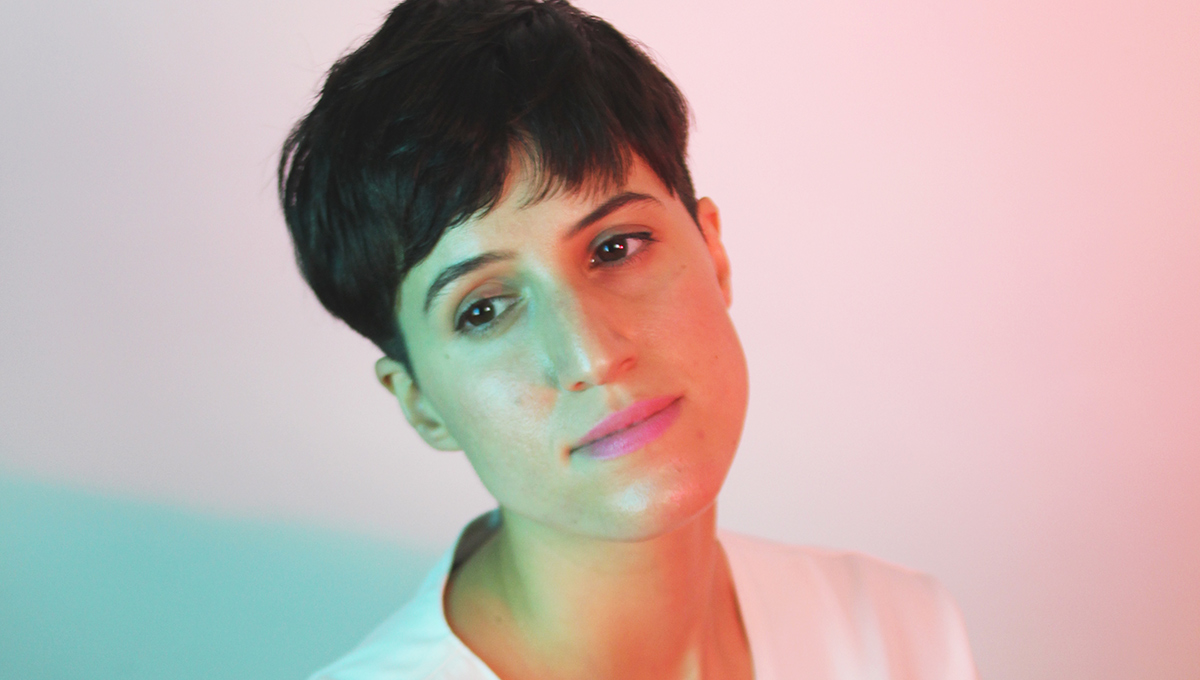
Amanda Hadi
“I find and talk to exceptional developers and technical leaders who might not even be considering a career move and try to attract them to our company,” says Hadi.
“We’re looking for people who are passionate about helping merchants, and it’s great to be working for a business that really matters right now.”
The role is rooted in being a resourceful and creative researcher and writing persuasive emails, she explains, building relationships and encouraging people to come and collaborate with Shopify. And while it may seem incongruous that somebody with employers such as the Toronto International Film Festival (TIFF) and the Canadian Opera Company (COC) on her resume has found a home in tech, Hadi says it’s a great fit because of her skills as a communicator and openness to new languages — a toolbox she attributes to her experience at Carleton.
“The ability to pick up on key terms, understand technical frameworks and do research,” she says, “all of this comes from my time at the College of the Humanities. There’s a lot of emphasis on how the program helps you develop as a person, but it also gives you intense hirable skills, which is how I’ve been able to switch jobs so seamlessly.
“It made me into a bit of a Swiss army knife.”
Hadi’s career path has been delineated by her interests and motivations, but like the journey of her fellow humanities graduate Pascale Arpin — an accomplished sign painter and freelance artist who you’ll read about a little later — it speaks to the wide range of options available to people with a holistic education.
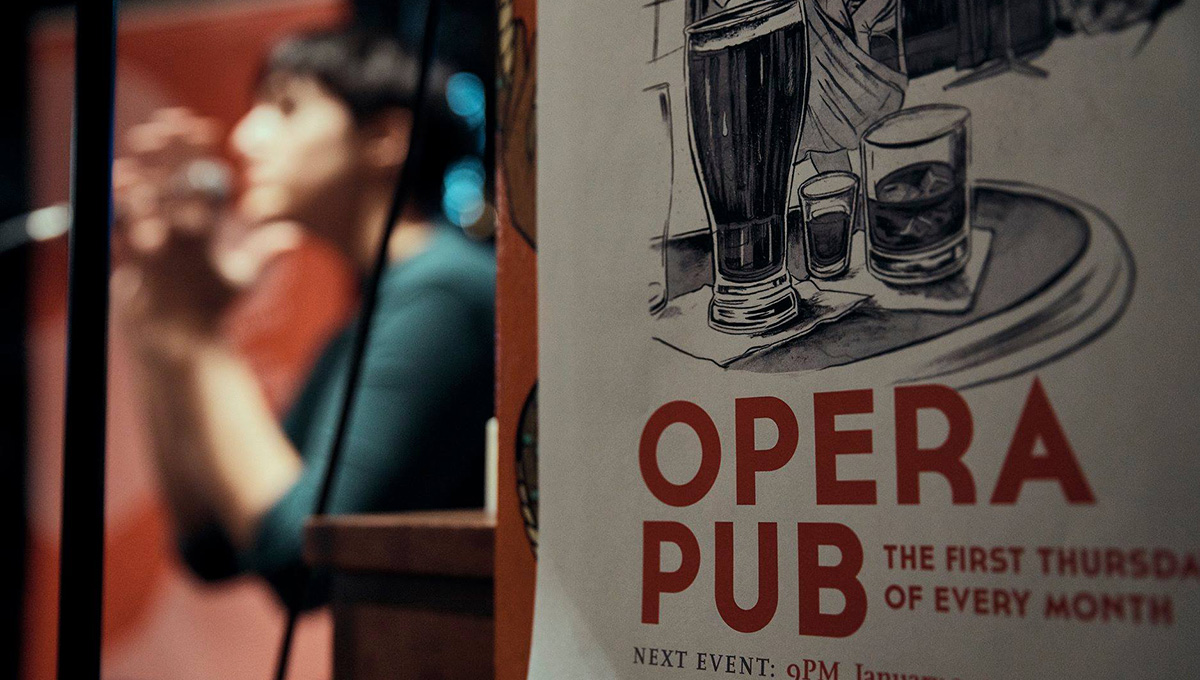
Confidence to Explore New Paths
Hadi grew up in Ottawa with parents who had emigrated to Canada from Israel and the West Bank and worked as a surgeon and paralegal. But they didn’t bat an eye when she decided to follow her older brother Jason into Carleton’s Humanities program.
“I was jealous of the history, philosophy and literature courses he was taking, mostly in small intimate classes,” she says.
“I love the opportunity it gave somebody like me who, at 17, was super indecisive. The courses were flexible. There were choices within choices.
“Carleton and the humanities gave me the confidence and skills to be fluid and explore different paths. It made me into somebody who has a passion for community and the things that communities produce.”
After graduating, Hadi moved to Toronto to pursue a master’s degree in Art History at the University of Toronto, then went on to work in a series of increasingly senior roles with TIFF, the COC and the Art Gallery of Ontario.
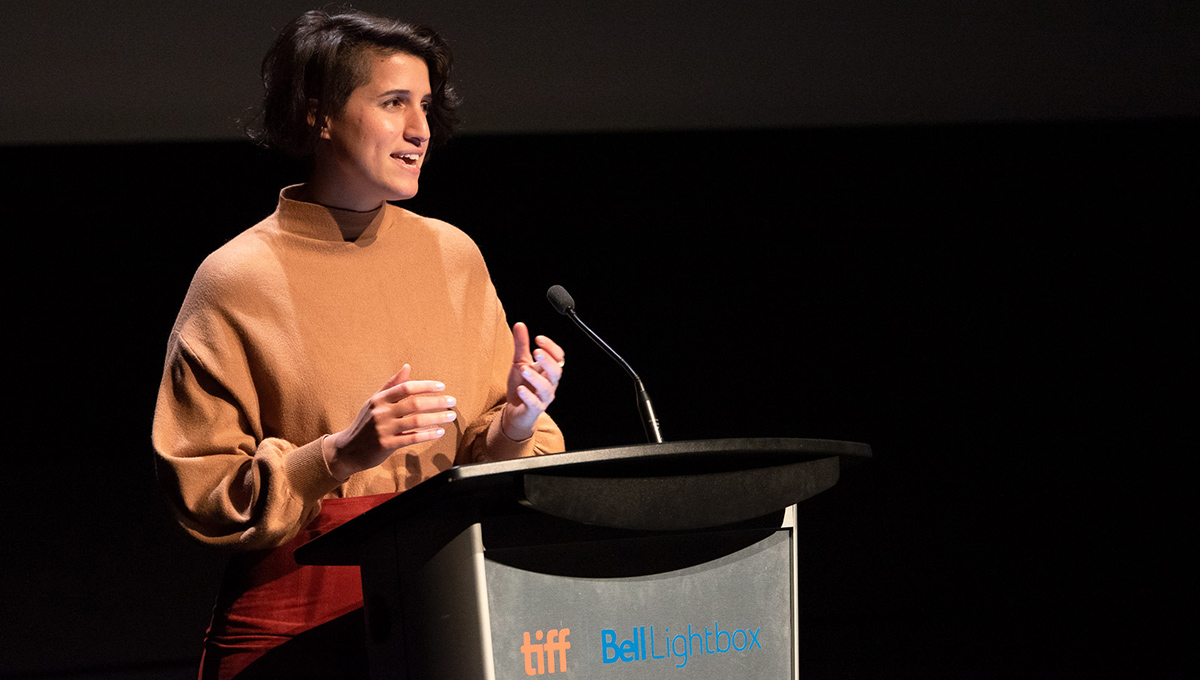
Amandi Hadi speaks at the Toronto International Film Festival (Photo: Nick Wons)
Her focus broadened from traditional print communications to digital and social media — “the scaffolding on which modern life is lived,” she calls it — and her suite of skills expanded.
While she was directing and producing online and in-person projects for large organizations, Hadi continued to volunteer with filmmakers and indie arts groups including, for the past six years, helping run Toronto’s award-winning Against the Grain Theatre. The innovative opera company is best known as the first in Canada to produce and livestream an entire opera, La Bohème, which premiered in 2019 on CBC Gem.
“I’ve always loved the arts and it was fun to get paid to do what I love,” she says.
“Everybody I worked for until Shopify has been a non-profit that relies heavily on government grants and donations, which forces you to be really creative.”
Considering her digital experience and technical fluency, Hadi sees Shopify as a natural progression. Her attention to inclusion in the arts, ensuring that her programming and collaborators reflect the diverse audiences they serve, will also continue in the new job, albeit now in the e-commerce space.
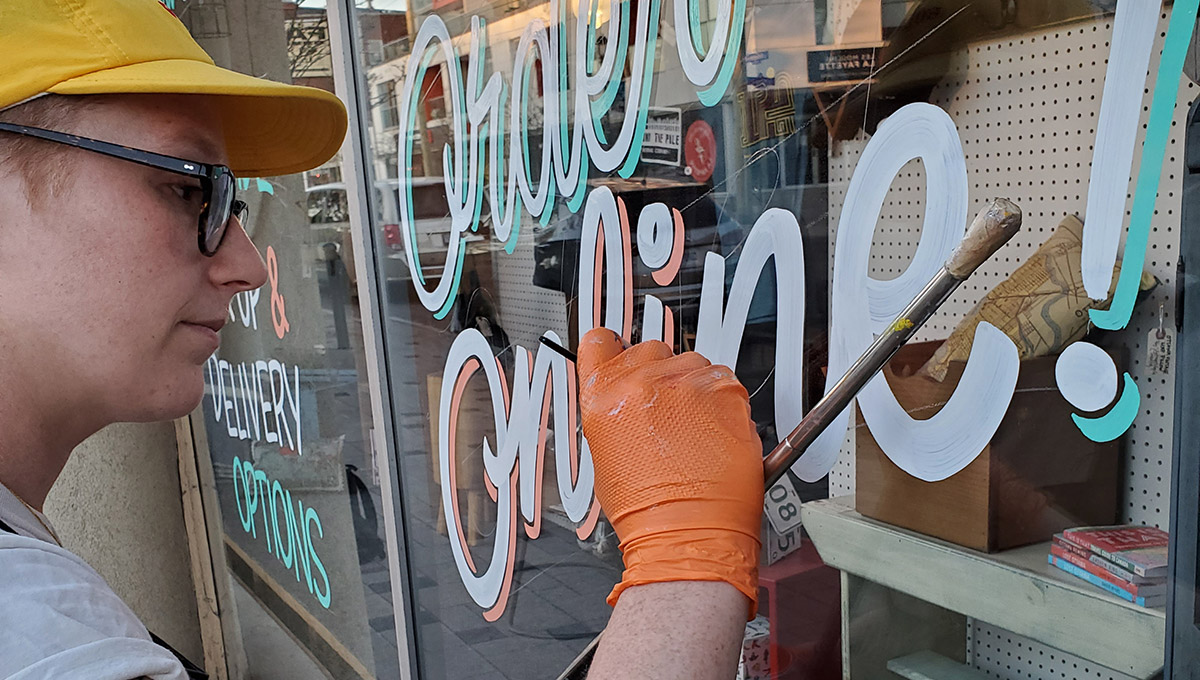
When Tim Burton Likes the Way You Paint
Pascale Arpin’s career also bridges art and commerce and was influenced by the College of the Humanities, but the similarities end there.
If you live in Ottawa, you’ve likely seen Arpin’s work. Although she does illustrations and paints canvasses and has brought film and TV props and sets to life, her niche these days is custom sign painting and hand lettering — a traditional style that adorns the windows of about five dozen local businesses, including hip spots like Little Victories Coffee on Bank St., Crows Nest Barber on Wellington St. and The Third in Hintonberg.
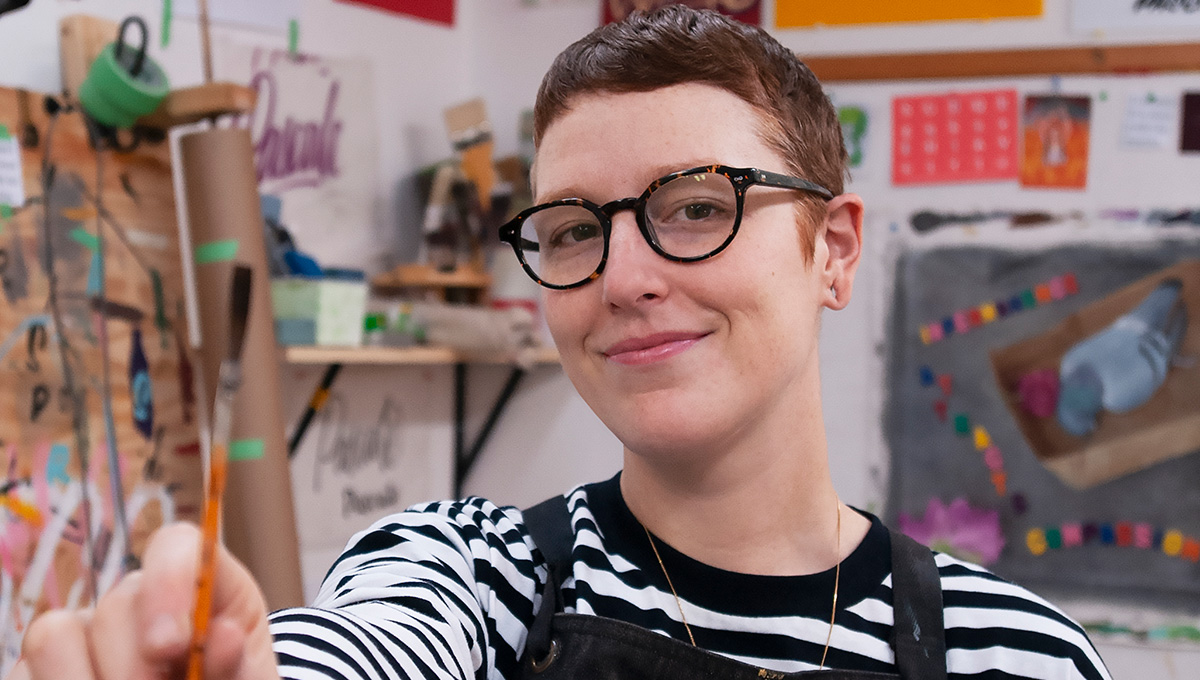
Pascale Arpin
“I followed a winding road to get to my current obsession,” says Arpin, who is arguably the city’s foremost practitioner of this intricate, ornate old-school craft.
“I always found it aesthetically pleasing but didn’t know how to do it. It looks like something you can create effortlessly, but you really have to understand the brush stroke and technique.”
Carleton’s Humanities program, she says, “helped me understand the world and why the world is the way it is today.” Moreover, as a francophone, it also gave her a nuanced grasp of English, which has been critical throughout her career.
After graduating, Arpin was awarded a scholarship to pursue a master’s degree in Sociology but instead moved to Iqaluit, where she lived for six years and did a series of jobs, from early childhood educator and youth arts programmer to a position with the Nunavut Arts and Crafts Association.
Although she was learning a lot about the business of arts, Arpin didn’t want to settle into a desk job, so she returned to freelance illustration and began working in film as a set decorator, scenic painter and props master. Wanting to be closer to family, she eventually moved back to Ottawa and dove into her own creative work.
A fateful trip to Minnesota in 2017 to take a workshop with renowned sign painter Mike Meyer led to her passion for hand lettering and techniques such as gilded windows, in which a mix of gold leaf, gelatin and water is painted onto windows to create an eye-catching mirror-like effect.
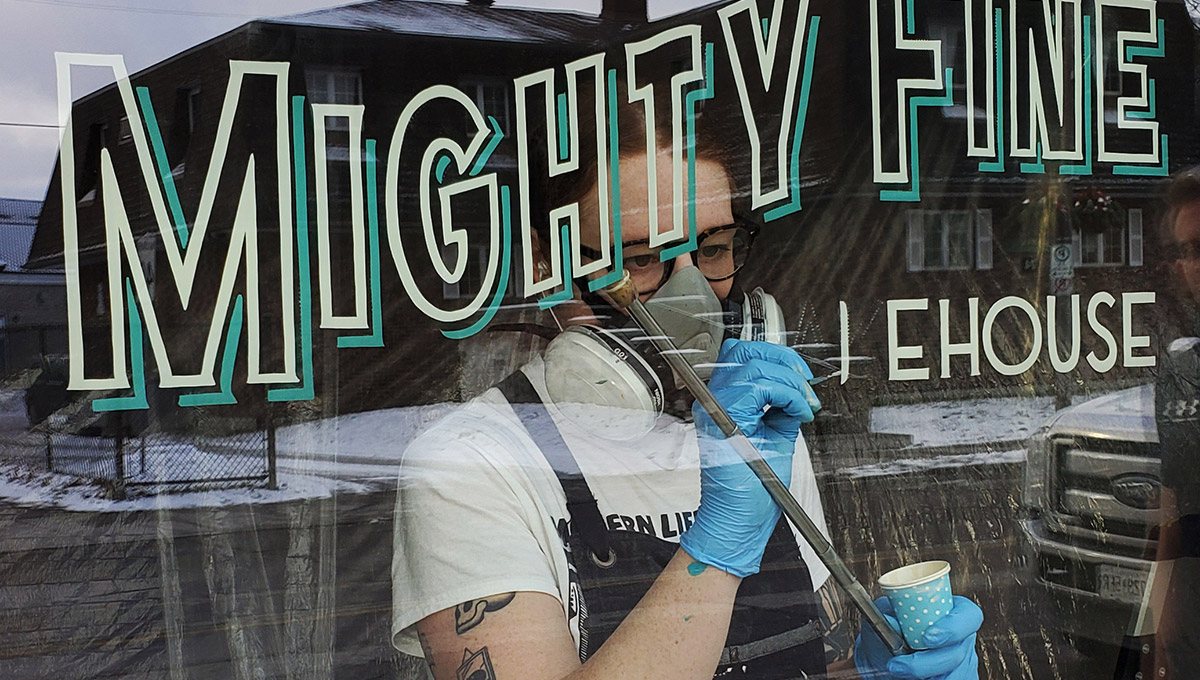
Pascale Arpin brings her talents to Mighty Fine Bakehouse
“It’s aesthetically pleasing and fits the belief system that the companies that hire me are trying to uphold,” Arpin says about bringing this look to Ottawa-area businesses.
“They’re supporting local artisans and quality signage over cheap vinyl products. It’s a local economy of businesses supporting one another.”
The connections Arpin made while working with Meyer, who she has continued to learn from, led to a meeting with Hollywood filmmaker Tim Burton in Las Vegas. Burton was struck by her work and asked her to fabricate and paint pieces for a multimedia exhibition he was working on for the city’s Neon Museum.
“That was a big turning point for me,” she says. “If Tim Burton liked the way I paint, then I needed to paint more.”
Arpin also recently illustrated a comic book written by Carleton Cultural Mediations PhD student Cara Tierney, “Phantomtits,” which tells the story of Tierney’s real-life experiences navigating the medical system as a trans person seeking surgery.
“I’ve done a lot of fascinating things,” says Arpin.
“What I do now is so different from what I studied at university, but for me everything has been cumulative, and you always benefit from having more knowledge.”
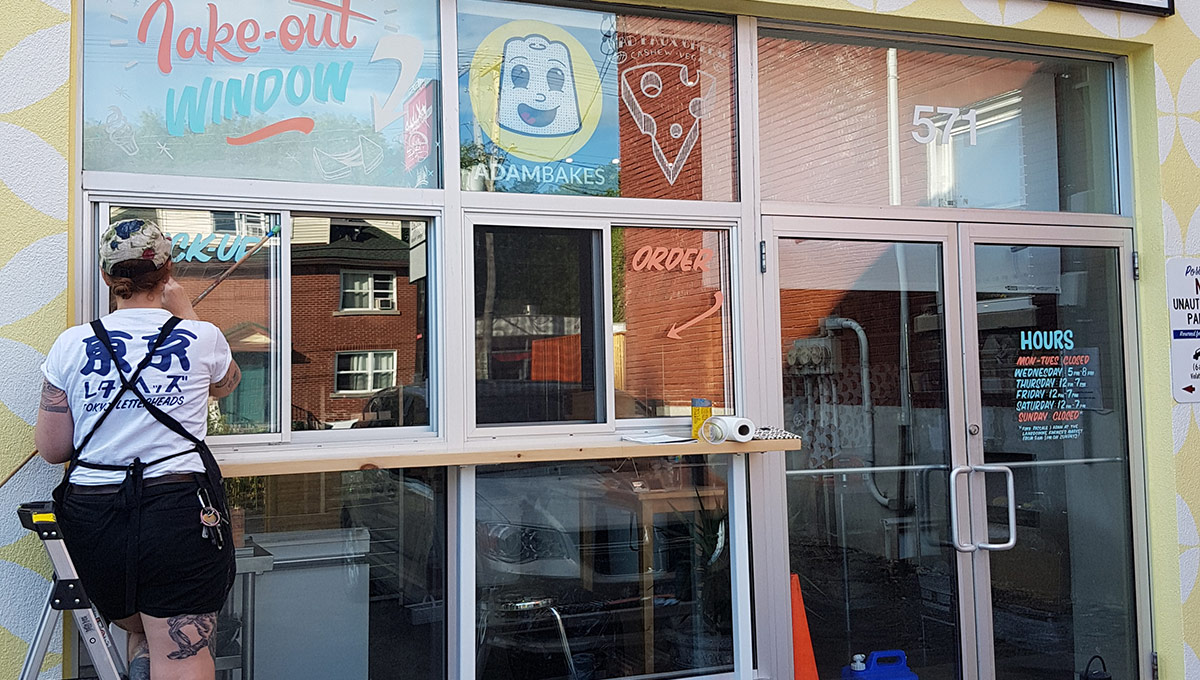
Thursday, January 21, 2021 in Graduate Students, Humanities
Share: Twitter, Facebook
